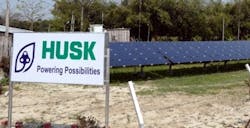Husk Power seeking public-private partners to deploy Renewable Minigrids in poorest African nations
Distributed energy firm Husk Power is seeking partnerships with governments in Sub-Saharan Africa to scale up renewable microgrids in off-grid and weak-grid communities on the continent.
The Colorado-based global microgrid developer hopes to increase public and private partnership to deploy more on-site power capacity in areas where grid conditions are struggling or non-existent. Husk Power announced the invitation during the fifth United Nations Conference on the Least Developed Countries.
Husk Power plans to finance construction on 200 minigrids within one or more of those distressed nations in Sub-Saharan Africa. The nations would be selected based both on the company’s business model and an ability to charge tariffs which are affordable for customers there, according to the release.
In exchange, governments which accommodate the partnerships would provide a 20- to 25-year concession to Husk as a developer there.
Want the Full Scoop on Microgrids Now and in the Future? Check out Microgrid Knowledge Conference!
Happening May16-17 in Anaheim CA: Register here
“As LDC governments in Sub-Saharan Africa look to roll out integrated energy systems that will be both fiscally sound and climate resilient, Husk is ready for action,” Manoj Sinha, Husk Power’s co-founder and CEO, said in a statement. “We have the scale and a proven business model, and it’s now time for (sustainable development goal) SDG7-focused public-private partnerships to move from pilot phase to full-fledged market interventions that can achieve radical scale.”
More than 30 nations are defined as Least Developed by the UN in Sub-Saharan Africa. These include countries such as Uganda, Chad, Mali, Rwanda, Somalia, Liberia, Angola, Ethiopia and Mozambique, among others.
To be considered an LDN, per-capita income is close to $1,000 per year and less. Although this is not listed as a criteria, often far less than half of the population in those nations have access to electricity.
The UN LDN program does have its graduates. For example, Botswana and Equatorial Guinea have risen in recent decades, while Angola could graduate out of the bottom rung this year.
Husk Power has been developing solar microgrids in various emerging nations for several years. The company currently boasts of more than 200 minigrids in operation in India, Nigeria and Tanzania and hopes to raise that total to 400 within another year. Husk secured $750,000 in debt funding from German financier DEG to expand those solar microgrid deployments in Nigeria and Africa.
Last year, Husk pledged to build up to 5,000 minigrids as part of signing a UN Energy Compact. Those minigrids could benefit up to 11 million people, the company said.
Overall, some 770 million human beings live without access to electricity, more than half of those in Sub-Sarharan Africa, according to the International Energy Agency. Having reliable electrical power has reduced death from disease, improves food safety and educational opportunities, evidence from the past 100-plus years indicates.
About the Author
Rod Walton, EnergyTech Managing Editor
Managing Editor
For EnergyTech editorial inquiries, please contact Managing Editor Rod Walton at [email protected].
Rod Walton has spent 17 years covering the energy industry as a newspaper and trade journalist. He formerly was energy writer and business editor at the Tulsa World. Later, he spent six years covering the electricity power sector for Pennwell and Clarion Events. He joined Endeavor and EnergyTech in November 2021.
Walton earned his Bachelors degree in journalism from the University of Oklahoma. His career stops include the Moore American, Bartlesville Examiner-Enterprise, Wagoner Tribune and Tulsa World.
EnergyTech is focused on the mission critical and large-scale energy users and their sustainability and resiliency goals. These include the commercial and industrial sectors, as well as the military, universities, data centers and microgrids. The C&I sectors together account for close to 30 percent of greenhouse gas emissions in the U.S.
He was named Managing Editor for Microgrid Knowledge and EnergyTech starting July 1, 2023
Many large-scale energy users such as Fortune 500 companies, and mission-critical users such as military bases, universities, healthcare facilities, public safety and data centers, shifting their energy priorities to reach net-zero carbon goals within the coming decades. These include plans for renewable energy power purchase agreements, but also on-site resiliency projects such as microgrids, combined heat and power, rooftop solar, energy storage, digitalization and building efficiency upgrades.

